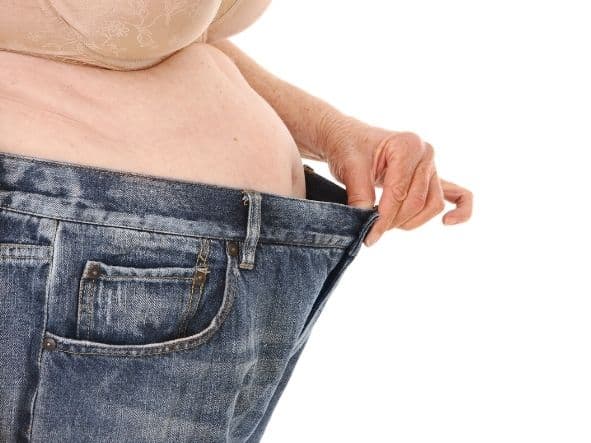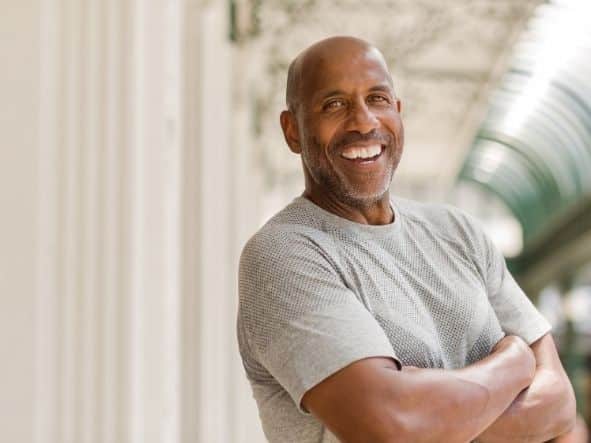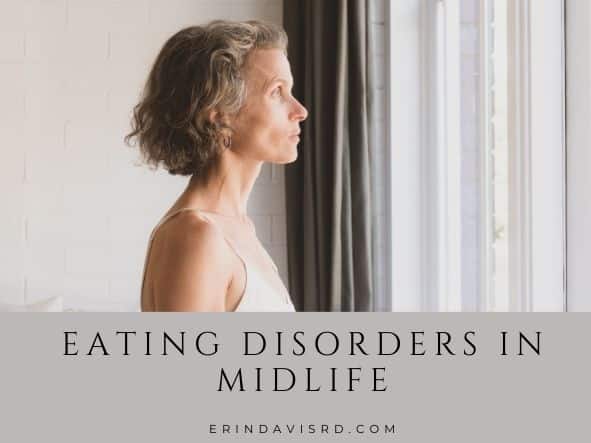While adolescents are the most common age group at risk for eating disorders, it doesn’t mean that you are immune in older age. Older men and women get eating disorders, too. Rather than feeling secure in your body, you may be more self-conscious than ever. Here’s why eating disorders in midlife happen, and how you can prevent them.
Middle age happens before you know it. Your body changes and you may find that you can’t eat like you used to in your twenties and thirties.
While this is completely normal, it can be difficult to accept. I always thought that as you age, you would care less and less about the physical appearance of your body.
But that’s not the case.
We have influencers constantly showing us how they lose belly fat, gain muscle, tone their bodies, etc. Your primary care provider may want to you lose weight. Spouses may make well-meaning comments about your food intake or body size.
And women aren’t the only ones developing eating disorders in middle age. It happens to men too.
If you’re new here, welcome! I’m Erin, an anti-diet dietitian and I’m passionate about getting rid of the idea that you have to diet to manage conditions like diabetes and PCOS.
So why do eating disorders happen in older adults? And what can you do about it?
Today’s post is all about the reasons why disordered eating occurs in people in their middle years and strategies to prevent eating disorders.
Let’s jump in!
- What are eating disorders?
- What is midlife?
- Challenges at midlife
- Why do eating disorders in midlife happen?
- How to prevent eating disorders in midlife
- Find a weight-neutral provider
- Support hormonal changes
- Don’t weigh yourself
- Look for non-scale benefits of exercise
- Limit social media
- Develop healthy coping strategies
- Embrace body appreciation
- Fight food insecurity with local resources
- Recognize early signs of eating disorders and get support
- Stop dieting to prevent eating disorders in midlife
Please note: As an Amazon Associate, I earn from qualifying purchases.
What are eating disorders?
First, let’s define eating disorders. Eating disorders are serious mental health conditions associated with severely altered eating habits and an obsession with body image.
With an eating disorder, a person is preoccupied with their body weight, shape, and food intake. As you would imagine, an eating disorder impacts both physical and emotional health.
Some negative consequences of prolonged eating disorders include nutrient deficiencies, electrolyte imbalance, heart issues, and gut and digestive problems. Not to mention the significant emotional toll of fixation and distress.
Other mental health disorders, such as depression, anxiety, and obsessive-compulsive disorder are common in those with eating disorders.
Eating disorder diagnoses
Each eating disorder has its own set of diagnostic criteria. Eating disorders can be diagnosed by your primary care provider or a mental health specialist.
Eating disorders include:
- Anorexia Nervosa: People with anorexia often have an intense fear of gaining weight and a distorted body image. They may drastically restrict their food intake, essentially starving their bodies. It’s also common to engage in excessive physical activity and take laxatives to lose weight.
- Bulimia Nervosa: Bulimia is characterized by the consumption of large amounts of food followed by self-inflicted vomiting, extreme exercise, or laxatives. There is commonly a cycle of eating, purging, guilt, and dieting.
- Binge Eating Disorder (BED): Individuals with BED consume large amounts of food in a short period. They lose control of their eating. While it’s similar to bulimia, with BED, there are no purging behaviors, like vomiting or use of laxatives.
- Avoidant/Restrictive Food Intake Disorder (ARFID): While it may appear like picky eating, it is not. ARFID is characterized by limited food preferences, avoidance of certain textures or smells, and a reluctance to try new foods. Often, folks with ARFID are not obsessed with weight loss or body image, but instead fixate on the avoidance of certain foods or food groups.
- Other Specified Feeding or Eating Disorder (OSFED): When a person has restrictive behaviors that do not fit the criteria for the other eating disorders, it’s still serious. OSFED includes uncontrollable night eating, atypical anorexia (exhibiting starvation-like eating patterns with a normal or larger body size), and low-frequency binging and purging.
While most eating disorders are diagnosed in young adulthood, it’s something that affects people of all ages.
What is midlife?

There is no universal definition for middle age, but it is commonly considered to be between 40 to 65 years old.
Middle age is the “in-between” stage of life. You aren’t exactly young, but you aren’t old. You may be raising children and caring for aging parents.
Of course, all stages of life bring change. However, there are unique physical, emotional, and social changes that occur in midlife.
Challenges at midlife

We’ve all heard of a midlife crisis. Well, what exactly is it, and why do they happen?
First of all, midlife sneaks up on you like a thief. You’re enjoying your adulthood and suddenly you’re 40!
A midlife crisis is associated with emotional, psychological, and sometimes behavioral challenges that some individuals may experience during middle age.
You may feel a sense of dissatisfaction. Maybe you wished for more, or different. You reflect on life choices and may feel disappointed. Perhaps you have a deep desire to make a change.
People have concerns about aging. Rightfully so! Aging brings about new aches, pains, and health issues.
It could be that you are bored of your monotonous routine. There might be tremendous pressure and overwhelm. Your list of responsibilities is likely the longest it’ll ever be.
Yes, experiencing a midlife crisis is a widely recognized concept in today’s culture. But it’s not a formal psychological or medical diagnosis. That doesn’t mean those emotions are messing with your health.
Why do eating disorders in midlife happen?

Whether a person has had an eating disorder since adolescence or has just developed one, there is an increasing number of folks being diagnosed with eating disorders in their 50s and older.
But why? Shouldn’t we be thankful that our bodies have brought us this far? It turns out there are several factors involved in disordered eating in older age.
Body dissatisfaction

Remember all of those feelings that bring about a midlife crisis? A deep sense of dissatisfaction, disappointment, pressure, concern, and discontentment is rarely good for mental health.
Now add in a physically changing body. You don’t burn calories like you used to. Your metabolism slows. Your energy levels decrease. You’ve got fat on your body in places where you’ve never had a “problem”.
Then there is the external pressure to prevent weight gain or to lose weight. Perhaps after your labs were drawn, your healthcare provider told you to cut carbs to prevent diabetes.
Or you need to lose weight to fix your knee pain. You scroll on social media and see thin, muscular bodies as the picture of health.
The internal and external messaging leads to body dissatisfaction. And body dissatisfaction, or bad body image, is associated with disordered eating.
And women aren’t alone. Men also develop more disordered eating in their 40s-50s. About 10% of the aging male population has disordered eating behaviors.
Menopause and eating disorders

Like young girls experiencing body changes in puberty, an older woman in the throes of menopause may discover their body isn’t what it used to be.
Weight gain is common in menopause. It’s mostly because we are aging and lose muscle mass over time.
However, it doesn’t help that your sleep may be disrupted (thanks night sweats and insomnia!) which can lead to fat storage and increased appetite.
Plus, your decreasing estrogen levels can lead to a change in the way your body stores fat. You may find that your clothes don’t fit the same.
Women who have more severe menopause symptoms tend to be more likely to develop eating disorders. Doesn’t seem fair, does it?!
Testosterone levels and eating disorders

Men aren’t immune to fluctuating hormones either. As you age, testosterone decreases. A drop in testosterone is associated with both aging and eating disorders.
Sometimes the gradual decline of testosterone levels in men is called andropause. Some researchers compare andropause to menopause, although not all agree that they are indeed alike.
There isn’t a direct link between andropause and eating disorder development. In other words, I can’t say that andopause causes eating disorders.
However, there seems to be an association between age-related decreases in testosterone and other psychiatric disorders.
It’s also been found that males who have higher age-related symptoms are more likely to have eating disorder symptoms.
Lower testosterone may be a factor that contributes to eating behaviors, like binge eating or loss-of-control eating.
Social media and eating disorders

I know a quick scroll on social media will expose me to middle-aged fitness influencers in skimpy outfits promising fat loss.
But in reality, those people are the exception, not the rule.
Plus, the more we compare our bodies to those we follow on social media, the more likely we’ll be dissatisfied.
They say comparison is the thief of joy. It’s true. Frequent scrolling can lead to a concern about appearance and increased anxiety.
I’ve spent years working on my body acceptance, and I still fall prey to the comparison trap.
Social media use can make our body dissatisfaction worse, make us depressed, and increase the risk of eating disorders.
Excessive usage of social media is also linked with dysmorphophobia, an excessive preoccupation with flaws in appearance.
Health conditions and eating disorders

There are health conditions associated with eating disorders, such as mental conditions like anxiety and ADHD.
For instance, the COVID-19 pandemic led to an increase in eating disorder development. It’s thought to be related to heightened anxiety and social isolation.
Then there are the metabolic conditions we see more of in middle age, like diabetes and high blood pressure.
My specialty area of health and wellness is diabetes. As if there aren’t enough challenges when you have diabetes, there is also a link between binge eating disorder and diabetes.
I wrote a whole post about eating disorders and diabetes. But in short, you are strongly encouraged to diet when you have diabetes and other health conditions like PCOS or heart disease.
At every check-up, it’s likely that you are weighed and asked about your eating. “Eat fewer carbs” (that doesn’t work), “count calories“, and “just lose weight” may be things you’ve heard.
I’ve even had clients have their doctors recommend keto or carnivore diets.
It’s a recipe for a broken relationship with food.
Food insecurity and eating disorders

Food insecurity is the lack of consistent access to food to promote health and adequate energy. Researchers have found that food insecurity is a risk factor for developing disordered eating in midlife.
Binge eating was the most common eating disorder among those who don’t have regular and reliable access to food.
If you don’t know when your next meal will be, your eating behaviors will change. You will likely overeat when you have food. It isn’t a weakness. It is self-preservation.
How to prevent eating disorders in midlife
While I can’t help you from throwing out your back after a good sneeze (I’m not alone, right?), I can give you some tips to prevent eating disorders in midlife.
Find a weight-neutral provider

I hate that I even have to say this, but if you feel uncomfortable when you go to the doctor, you need a new doctor. You shouldn’t feel ashamed at the doctor’s office, only supported.
You are in control of your health and wellness. Your primary care provider is there to aid you on your journey, not make you feel like garbage about your weight.
There are providers that prioritize weight-neutral care. What is weight-neutral care?
Your provider will focus on the big wellness picture by encouraging physical activity, balanced diet, proper sleep, healthy coping—without suggesting weight loss.
A weight-neutral provider will also make you feel comfortable and supported. The office should be free of weight-based messaging and feel like a non-judgmental space.
Check out reviews to see what people are saying about the potential clinician. Ask your local friends and family if they have a provider they love. Chances are, the beloved providers are compassionate and understanding.
Support hormonal changes

Hormonal changes are a given as we age. But there are some things you can do to better handle the transition.
Some foods can promote health at any age. The Mediterranean diet for menopause has been shown to reduce menopause symptoms.
This doesn’t mean you have to strictly follow a diet. Rather, add in the nutrient-dense foods. Focus on adding veggies, whole grains, and legumes to your meals, and start cooking with olive oil.
There wasn’t any restriction that caused a reduction in symptoms. It was the legume and olive oil consumption that was associated with menopause benefits.
Likewise, consuming preventive nutrients like vitamins D and C, calcium, and B vitamins can help reduce other health conditions associated with menopause. Try this delicious chopped kale and blueberry salad.
For men, it seems as though the jury is still out. A nutrient-dense diet can certainly promote health in many ways, but it may not stop the reduction in testosterone that occurs with age.
Don’t weigh yourself

One of the only behaviors I try to encourage my clients to give up is weighing themselves.
The scale can do more harm than good. It can ruin your mood AND be an external cue to eat…or not eat.
If you’re thinking that weighing yourself will keep you on track and prevent weight gain, I want you to journal how you feel when you get off the scale.
Does it make you feel in control? Do you have fewer food cravings if you’ve gained weight? Is it easy to lose weight?
Usually, the answer is NO! It may be disappointing to see the number increasing as you get older. But knowing the number isn’t what stops weight gain from happening.
So why not stop?
It may be common practice to be weighed at the doctor’s office, but you can refuse if it gets to you. Remember that you are in the driver’s seat.
If your weight is required because of a dosage calculation or another medical necessity, you can close your eyes or step on the scale backward and ask them not to reveal the number.
Look for non-scale benefits of exercise

Do you think of exercise as a means to burn calories or lose weight? Let’s think of some other benefits.
Feel more energized when you exercise? Do you connect with others at the gym? Are you able to go up the stairs without getting winded? Able to keep up with your kids or grandkids?
Does it help relieve stress? Make you feel accomplished? Give you confidence and strength?
These are all good reasons to move your body in an enjoyable way—and they don’t involve weight loss.
Finding a non-scale reason to get physical activity will make movement a regular part of your life. Looking for ways to fit it all in? Check out this post about workouts for busy moms.
Limit social media

If you use social media as a distraction from your mounting responsibilities (raising my hand) or a way to stay in the loop, you may want to set some limits.
Besides setting screen limits, you can unfollow influencers who are triggering. You’ll know by the way they make you feel about your own body, diet, or physical activity routine.
If you see them and you feel guilty that you aren’t doing what they are doing, unfollow them. You want to fill your feed with people who inspire you to be the healthiest version of yourself—mind, body, and spirit.
Develop healthy coping strategies

Are you under a lot of pressure to perform at work, care for your aging parents, manage your household, and raise your children?
You aren’t alone. Finding a healthy way to cope with all of the responsibilities in mid-life is key. Here are some ideas:
- Movement
- Mindfulness
- Prayer and meditation
- Get outside
- Talk with friends and family
- Deep and focused breathing
- Find a new hobby
- Aromatherapy
- Tap into creative expression (music, painting, sketching, etc.)
- Establish a restful routine (i.e., nightly bath, skincare routine, stretching, etc.)
- Get professional help
Embrace body appreciation

Appreciating your body for what it is can help improve your body satisfaction. Instead of body checking and scrutinizing your perceived flaws, think of things you are grateful for.
Did you get out of bed? Walk? Fight off illness? Get out of your work chair? Squat down to pick up the laundry basket? Carry groceries up your stairs? Lift a toddler?
Your body can do amazing things. Try to appreciate the little things.
You don’t have to love every lump and bump on your body. The goal is contentment.
It can be helpful to wear clothes that fit and feel good on your body. Also, except for a quick glance, try to stop looking in the mirror—especially when naked.
Fight food insecurity with local resources

If you are struggling to get enough food, there are resources available to help you.
Local food banks and churches usually have little to no requirements to get food. No judgments. And it’s usually nutritious food.
This app helps connect people in need of food with people who want to give food away.
There’s also government assistance. Supplemental Nutrition Assistance Program (SNAP) is a way to add to your grocery budget so you can get the food you and your family need.
Recognize early signs of eating disorders and get support

Eating disorders don’t pop up out of nowhere. It is usually a gradual process that starts with a desire to change your body or diet in some way.
Noticing these signs of disordered eating behaviors and getting help right away may prevent it from progressing.
Common signs of disordered eating
- Body image issues: This may be an abnormal fixation or preoccupation with body weight, shape, or size. Your perception of yourself may not match the number on the scale, or what others say. It may include frequent body checking in the mirror or on the scale.
- Food fixation: Constantly calculating your macros or carbs? Obsessed with food? Are you always following restrictive diets, fasting, or drastically reducing food intake? Do you find yourself avoiding food when you don’t know the nutritional value? These dieting behaviors may have you ignoring your natural hunger and fullness cues.
- Withdrawal: It can be difficult to diet with an audience. Do you withdraw from social activities that involve food, such as eating out with friends or family gatherings, due to fear of eating in front of others?
- Food shame: Do you feel ashamed about your food intake? Hiding food, food wrappers, or evidence of eating are some ways people will eat in secret. Do you feel more comfortable eating alone and in secret, because you often in large or extremely small quantities?
- Exercise obsession: Compulsive or excessive exercising, even when injured, fatigued, or in poor weather conditions. Feeling anxious or guilty when unable to exercise.
- Changes in Eating Patterns: Disordered eating patterns, such as eating very small portions, avoiding certain food groups, or following strict rules about when and what to eat.
- Mood Changes: Mood swings, irritability, depression, anxiety, or heightened sensitivity to criticism or comments about weight or appearance.
- Physical Symptoms: Physical signs of malnutrition or dehydration, such as fatigue, dizziness, weakness, hair loss, dry skin, or brittle nails.
Stop dieting to prevent eating disorders in midlife

One of the best things you can do to make peace with food is to stop dieting. Intuitive eating can be freeing in so many ways.
Imagine being able to eat your favorite foods—without guilt. Would you like to be able to eat normally, without binging or restricting?
I can help. I’m passionate about healing relationships with food. You can manage your health condition without restriction. If you’re looking to break the cycle of guilt and shame that goes along with dieting, let’s meet.
Book a free discovery call to see if your health goals align with my services. I look forward to meeting you!
Disclaimer: This information is intended as a self-help tool for your own use, at your own risk. My opinions do not reflect the values, thoughts, or opinions of the Academy of Nutrition and Dietetics or other professional health organizations.
References
- Arija Val V, Santi Cano MJ, Novalbos Ruiz JP, Canals J, Rodríguez Martín A. Caracterización, epidemiología y tendencias de los trastornos de la conducta alimentaria [Characterization, epidemiology and trends of eating disorders]. Nutr Hosp. 2022;39(Spec No2):8-15. doi:10.20960/nh.04173
- National Institute of Mental Health. Eating Disorders. No date. Website: https://www.nimh.nih.gov/health/statistics/eating-disorders
- Lewis-Smith H, Diedrichs PC, Rumsey N, Harcourt D. A systematic review of interventions on body image and disordered eating outcomes among women in midlife [published correction appears in Int J Eat Disord. 2016 Apr;49(4):434]. Int J Eat Disord. 2016;49(1):5-18. doi:10.1002/eat.22480
- Mangweth-Matzek B, Kummer KK, Hoek HW. Update on the epidemiology and treatment of eating disorders among older people. Curr Opin Psychiatry. 2023;36(6):405-411. doi:10.1097/YCO.0000000000000893
- Ko SH, Jung Y. Energy Metabolism Changes and Dysregulated Lipid Metabolism in Postmenopausal Women. Nutrients. 2021;13(12):4556. Published 2021 Dec 20. doi:10.3390/nu13124556
- Naser B, Castelo-Branco C, Meden H, et al. Weight gain in menopause: systematic review of adverse events in women treated with black cohosh. Climacteric. 2022;25(3):220-227. doi:10.1080/13697137.2021.1973993
- Kummer KK, Mangweth-Matzek B. Male eating disorders in midlife-possible links between excessive sports and hormones. Aging Male. 2023;26(1):2154571. doi:10.1080/13685538.2022.2154571
- Kummer KK, Pope HG, Hudson JI, Kemmler G, Pinggera GM, Mangweth-Matzek B. Aging male symptomatology and eating behavior. Aging Male. 2019;22(1):55-61. doi:10.1080/13685538.2018.1477931
- Jiotsa B, Naccache B, Duval M, Rocher B, Grall-Bronnec M. Social Media Use and Body Image Disorders: Association between Frequency of Comparing One’s Own Physical Appearance to That of People Being Followed on Social Media and Body Dissatisfaction and Drive for Thinness. Int J Environ Res Public Health. 2021;18(6):2880. Published 2021 Mar 11. doi:10.3390/ijerph18062880
- Laughter MR, Anderson JB, Maymone MBC, Kroumpouzos G. Psychology of aesthetics: Beauty, social media, and body dysmorphic disorder. Clin Dermatol. 2023;41(1):28-32. doi:10.1016/j.clindermatol.2023.03.002
- Barone M, De Bernardis R, Persichetti P. Before-and-After Photography on Social Media: The Pursuit of Impossible Beauty. Aesthetic Plast Surg. Published online December 28, 2023. doi:10.1007/s00266-023-03744-x
- Harris SR, Carrillo M, Fujioka K. Binge-Eating Disorder and Type 2 Diabetes: A Review. Endocr Pract. 2021;27(2):158-164. doi:10.1016/j.eprac.2020.10.005
- Yu Z, Muehleman V. Eating Disorders and Metabolic Diseases. Int J Environ Res Public Health. 2023;20(3):2446. Published 2023 Jan 30. doi:10.3390/ijerph20032446
- Tistarelli N, Fagnani C, Troianiello M, Stazi MA, Adriani W. The nature and nurture of ADHD and its comorbidities: A narrative review on twin studies. Neurosci Biobehav Rev. 2020;109:63-77. doi:10.1016/j.neubiorev.2019.12.017
- Hooper SC, Kilpela LS, Gomez F, Middlemass KM, Becker CB. Eating disorder pathology in a sample of midlife and older adults experiencing food insecurity. Eat Behav. 2023;49:101742. doi:10.1016/j.eatbeh.2023.101742
- Vetrani C, Barrea L, Rispoli R, et al. Mediterranean Diet: What Are the Consequences for Menopause?. Front Endocrinol (Lausanne). 2022;13:886824. Published 2022 Apr 25. doi:10.3389/fendo.2022.886824
- Erdélyi A, Pálfi E, Tűű L, et al. The Importance of Nutrition in Menopause and Perimenopause-A Review. Nutrients. 2023;16(1):27. Published 2023 Dec 21. doi:10.3390/nu16010027
- Wynne-Ellis MM, Mursu JJ, Tuomainen TP, Bertone-Johnson E, Salonen JT, Virtanen JK. Dietary fat quality and serum androgen concentrations in middle-aged men. Eur J Clin Nutr. 2024;78(2):99-106. doi:10.1038/s41430-023-01358-9
- Mulgrew KE, Findlay C, Lane BR, Halliwell E. Does body appreciation or satisfaction buffer against idealised functionality-focused images of models?. Body Image. 2021;36:45-52. doi:10.1016/j.bodyim.2020.09.007
About the author
Erin is a registered dietitian and diabetes educator with almost 20 years of experience. She specializes in weight-inclusive diabetes care and prevention, intuitive eating, fitness, and women’s health. She works as a consultant and writer in the health and wellness space. Erin is passionate about empowering people to manage their own health and to have peace with food.


